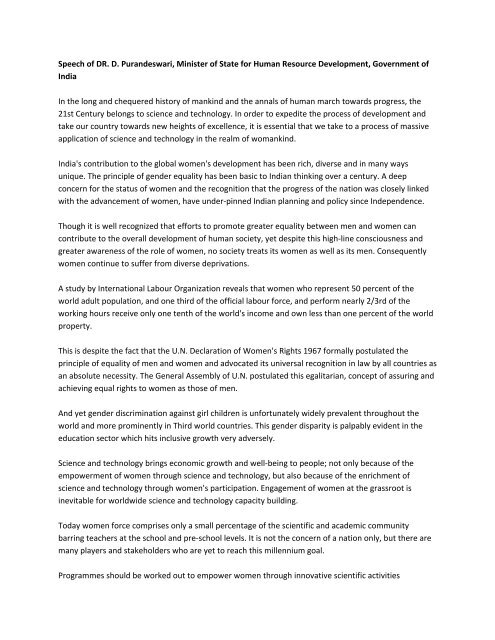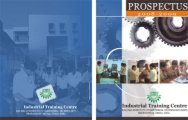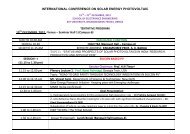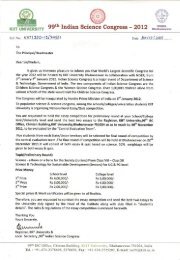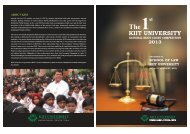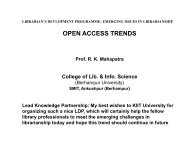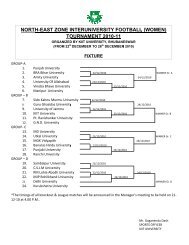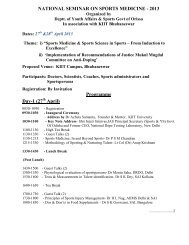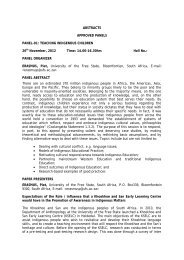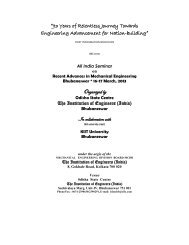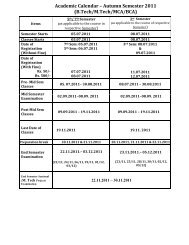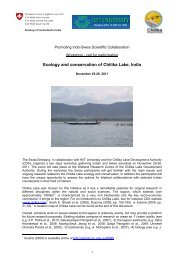Speech of DR. D. Purandeswari, Minister of State for ... - KIIT University
Speech of DR. D. Purandeswari, Minister of State for ... - KIIT University
Speech of DR. D. Purandeswari, Minister of State for ... - KIIT University
You also want an ePaper? Increase the reach of your titles
YUMPU automatically turns print PDFs into web optimized ePapers that Google loves.
<strong>Speech</strong> <strong>of</strong> <strong>DR</strong>. D. <strong>Purandeswari</strong>, <strong>Minister</strong> <strong>of</strong> <strong>State</strong> <strong>for</strong> Human Resource Development, Government <strong>of</strong><br />
India<br />
In the long and chequered history <strong>of</strong> mankind and the annals <strong>of</strong> human march towards progress, the<br />
21st Century belongs to science and technology. In order to expedite the process <strong>of</strong> development and<br />
take our country towards new heights <strong>of</strong> excellence, it is essential that we take to a process <strong>of</strong> massive<br />
application <strong>of</strong> science and technology in the realm <strong>of</strong> womankind.<br />
India's contribution to the global women's development has been rich, diverse and in many ways<br />
unique. The principle <strong>of</strong> gender equality has been basic to Indian thinking over a century. A deep<br />
concern <strong>for</strong> the status <strong>of</strong> women and the recognition that the progress <strong>of</strong> the nation was closely linked<br />
with the advancement <strong>of</strong> women, have under‐pinned Indian planning and policy since Independence.<br />
Though it is well recognized that ef<strong>for</strong>ts to promote greater equality between men and women can<br />
contribute to the overall development <strong>of</strong> human society, yet despite this high‐line consciousness and<br />
greater awareness <strong>of</strong> the role <strong>of</strong> women, no society treats its women as well as its men. Consequently<br />
women continue to suffer from diverse deprivations.<br />
A study by International Labour Organization reveals that women who represent 50 percent <strong>of</strong> the<br />
world adult population, and one third <strong>of</strong> the <strong>of</strong>ficial labour <strong>for</strong>ce, and per<strong>for</strong>m nearly 2/3rd <strong>of</strong> the<br />
working hours receive only one tenth <strong>of</strong> the world's income and own less than one percent <strong>of</strong> the world<br />
property.<br />
This is despite the fact that the U.N. Declaration <strong>of</strong> Women's Rights 1967 <strong>for</strong>mally postulated the<br />
principle <strong>of</strong> equality <strong>of</strong> men and women and advocated its universal recognition in law by all countries as<br />
an absolute necessity. The General Assembly <strong>of</strong> U.N. postulated this egalitarian, concept <strong>of</strong> assuring and<br />
achieving equal rights to women as those <strong>of</strong> men.<br />
And yet gender discrimination against girl children is un<strong>for</strong>tunately widely prevalent throughout the<br />
world and more prominently in Third world countries. This gender disparity is palpably evident in the<br />
education sector which hits inclusive growth very adversely.<br />
Science and technology brings economic growth and well‐being to people; not only because <strong>of</strong> the<br />
empowerment <strong>of</strong> women through science and technology, but also because <strong>of</strong> the enrichment <strong>of</strong><br />
science and technology through women's participation. Engagement <strong>of</strong> women at the grassroot is<br />
inevitable <strong>for</strong> worldwide science and technology capacity building.<br />
Today women <strong>for</strong>ce comprises only a small percentage <strong>of</strong> the scientific and academic community<br />
barring teachers at the school and pre‐school levels. It is not the concern <strong>of</strong> a nation only, but there are<br />
many players and stakeholders who are yet to reach this millennium goal.<br />
Programmes should be worked out to empower women through innovative scientific activities
integrating action oriented literacy, sound micro‐finance and micro‐enterprise training as well as an<br />
understanding <strong>of</strong> legal rights and advocacy.<br />
Given appropriate space, the women <strong>for</strong>ce can play an increasingly important role in social, industrial<br />
and economic development <strong>of</strong> the country. The involvement and engagement <strong>of</strong> women in science on<br />
an equal footing with men would directly contribute to improving the livelihood <strong>of</strong> people, making it<br />
more sustainable and thereby promoting the social and economic advancement <strong>of</strong> societies.<br />
It is important to note that women's empowerment cannot be complete without their equitable<br />
participation in science and technology. Women have special role to play in the area <strong>of</strong> science and<br />
technology. They can bring a wave <strong>of</strong> creative and generative energy in the field <strong>of</strong> science and<br />
technology. Today their participation is restricted and limited to very less numbers because <strong>of</strong><br />
widespread discrimination at the basic education levels and lack <strong>of</strong> opportunities <strong>for</strong> pursuing higher<br />
studies.<br />
Reducing drudgery with the help <strong>of</strong> science and technology is another major area <strong>of</strong> importance <strong>for</strong><br />
freeing women from the never ending domestic chores and making her contribute ‐ to the enrichment<br />
<strong>of</strong> mainstream <strong>of</strong> the society.<br />
There is a need <strong>for</strong> global capacity building in science and technology, particularly the creation <strong>of</strong> a<br />
critical mass <strong>of</strong> well‐educated scientists and engineers among women, this would make the greatest<br />
possible use <strong>of</strong> brainpower, and by giving women and men equal opportunities to excel it would be the<br />
right thing to do. There is a need to enable the billions <strong>of</strong> women around the world to apply the fruits <strong>of</strong><br />
science and technology, such as useful products and services, <strong>for</strong> growing their countries' economies<br />
while improving their own lives.<br />
Science and technology <strong>of</strong>fer solutions to many challenges faced by rural women also; they can<br />
contribute to food security by boosting crop yields; reduce women's domestic and productive work by<br />
introducing labour‐saving technologies; and increase participation <strong>of</strong> women in the rural labour market<br />
through better communications.<br />
It would help trans<strong>for</strong>ming India into a developed nation by 2020. This necessitates not only successful<br />
adoption <strong>of</strong> latest technologies but also developing appropriate technologies. The parameters that<br />
determine national development will also keep changing throwing up new challenges. India is a country<br />
<strong>of</strong> diversity ‐ social, cultural and economic and this diversity which is the fabric <strong>of</strong> the country has<br />
tremendous impact on achieving prosperity. Science and technology can be a powerful tool in bridging<br />
the divide and achieving inclusive development If and only if it is employed <strong>for</strong> this purpose.<br />
The United Nation's Millennium Development goals (MDGs), set to overcome poverty, exclusion and<br />
environmental problems by the year 2015 have identified eight international development goals that<br />
include eradicating extreme poverty and hunger including achieving decent employment <strong>for</strong> women,<br />
universal primary education, promoting gender equality and empowering <strong>of</strong> women, reducing child
mortality, improving maternal health, combating disease epidemics such as HIV/AIDS, among other<br />
things. Interestingly, even a cursory look at these goals drive home the point that almost all <strong>of</strong> them<br />
centre round the welfare <strong>of</strong> women and also spell that the aim <strong>of</strong> the MDGs can never be achieved<br />
without the participation and unfettered involvement <strong>of</strong> women.<br />
With rapid technological developments, inequality will further worsen unless special ef<strong>for</strong>ts are made to<br />
address the needs <strong>of</strong> the poor, women, rural, disabled and others who are un‐reached or less reached.<br />
Multi‐pronged strategy is required to make India's innovation system meet the needs <strong>of</strong> all classes in the<br />
society.<br />
The need <strong>of</strong> the hour is to strengthen the capabilities <strong>of</strong> those ignored so far and tap their potential in<br />
nation building activities. Describing the Rural Poverty Report 2011, released recently by the UN<br />
International Fund <strong>for</strong> Agricultural Development (IFAD), the IFAD President Kanayo F Nwanze said I<br />
quote; "The report makes clear that it is time to look at poor smallholder farmers and rural<br />
entrepreneurs in a completely new way ‐ not as charity cases but as people whose Innovation,<br />
dynamism and hard work will bring prosperity to their communities".<br />
Programmes should be strengthened to bring about a greater involvement <strong>of</strong> women in science and<br />
technology. These should include measures to motivate girls to take up science and technology <strong>for</strong><br />
higher education and also ensure that development projects with scientific and technical inputs have<br />
total involvement <strong>of</strong> women. Ef<strong>for</strong>ts to develop a scientific temper and awareness should be stepped<br />
up.<br />
Our science and technology community, <strong>of</strong> teachers and researchers, must show us the way ahead. We<br />
need a quantum jump which would help us to complete our programme in this direction. This agenda<br />
can no longer wait.<br />
We live in an age where human knowledge, based particularly on science and technology, is expanding<br />
at an unprecedented pace and in that sort <strong>of</strong> world, access to knowledge has become the most<br />
important determinant <strong>of</strong> the power and wealth <strong>of</strong> a country and its place in the comity <strong>of</strong> nations


